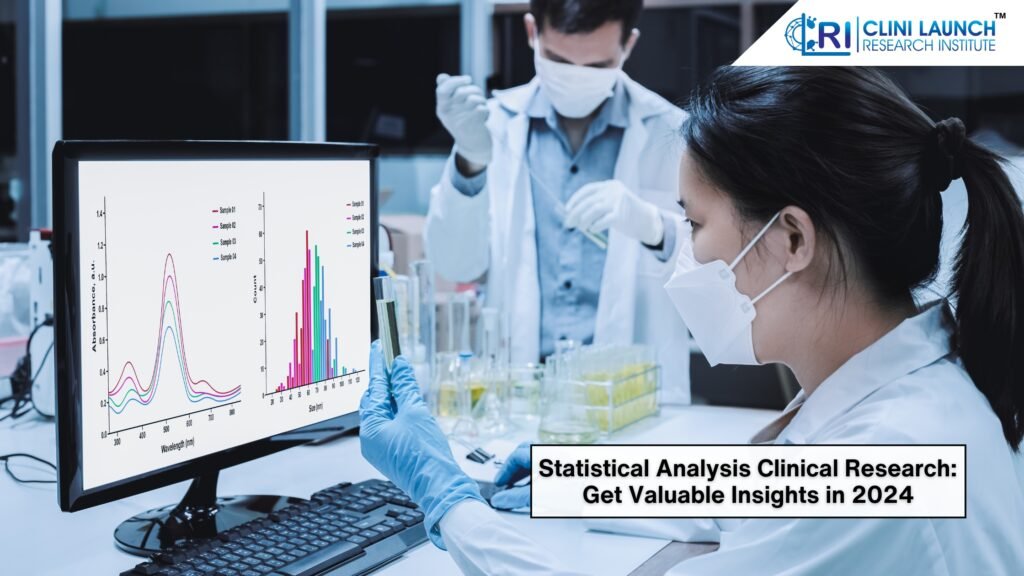Statistical Analysis Clinical research has been instrumental in advancing healthcare, yielding breakthroughs in treatments and preventative measures. However, the efficacy of these endeavours is contingent upon the rigorous application of statistical analysis. The absence of robust data analysis can lead to misleading conclusions, compromising the integrity of research findings. Thus, statistical methods are paramount in ensuring the reliability and validity of clinical trials.
By employing statistical analysis, researchers can extract meaningful insights from complex datasets, facilitating evidence-based decision-making. This discipline is pivotal in determining the efficacy of interventions, assessing treatment risks, and identifying patient populations most likely to benefit. Consequently, statistical analysis serves as a cornerstone in modern healthcare research.
Statistical Analysis Clinical Research – The Data Dilemma

Credit: Karthik C (Graphic Designer at CliniLaunch)
Clinical research is pivotal to healthcare advancement. At its core lies the meticulous collection and analysis of data. Statistical analysis is instrumental in extracting meaningful insights from this data. However, the importance of data analysis in ensuring accurate and reliable findings cannot be overstated.
Flawed data analysis can lead to erroneous conclusions, jeopardizing patient safety and hindering therapeutic progress. Consider the case of Vioxx, a drug withdrawn due to increased heart risks, highlighting the consequences of inadequate statistical methods in healthcare research. Such failures erode public trust and hinder future research efforts.
To ensure the integrity and impact of clinical research, robust statistical analysis is paramount. It guides research design, data collection, and interpretation, ultimately safeguarding patient welfare and driving medical innovation.
Statistical Analysis Clinical Research – A Cornerstone of Healthcare

Credit: Karthik C (Graphic Designer at CliniLaunch)
Statistical analysis is an indispensable tool in the advancement of clinical research. It serves as the foundation for transforming raw data into actionable insights that drive healthcare innovation. By employing rigorous statistical methods, researchers can objectively evaluate the efficacy and safety of medical interventions, contributing significantly to developing evidence-based practices.
The role of statistics in medical studies is multifaceted. It encompasses the entire research lifecycle, from study design and sample size determination to data collection, analysis, and interpretation. Through the application of appropriate statistical methods, researchers can uncover hidden patterns, identify significant trends, and quantify the impact of treatments. This rigor is essential for minimizing the risk of erroneous conclusions and ensuring the reliability of research findings.
Moreover, statistical analysis is crucial for assessing the importance of data analysis in clinical trials. By quantifying treatment effects and measuring variability, researchers can make informed decisions about the clinical relevance of their findings. This ultimately contributes to the translation of research into improved patient outcomes.
Benefits – Transforming Healthcare through Data-Driven Insights
Statistical analysis is the cornerstone of modern clinical research. It empowers researchers to extract meaningful insights from complex data, ensuring the reliability and validity of research findings. By employing statistical methods, researchers can assess treatment efficacy, develop accurate diagnostic tools, and understand disease progression.
A key role of statistics in medical studies is to establish the effectiveness and safety of new interventions. It also facilitates personalized medicine by identifying patient subgroups that may respond differently to treatments. Ultimately, statistical analysis is instrumental in transforming healthcare through data-driven decision-making and improving patient outcomes.
The Evolving Landscape of Statistical Analysis in Clinical Research

Credit: Karthik C (Graphic Designer at CliniLaunch)
The landscape of clinical research is undergoing a paradigm shift, driven by the increasing complexity of data and the demand for rigorous evidence-based decision-making. At the heart of this transformation lies statistical analysis. By employing sophisticated statistical methods, researchers can extract meaningful insights from vast datasets, informing the development of effective interventions and improving patient outcomes. The role of statistics in medical studies has never been more critical.
The integration of artificial intelligence (AI) and machine learning (ML) into statistical analysis is poised to revolutionize the field. These technologies offer unprecedented opportunities to uncover hidden patterns, optimize experimental design, and enhance predictive modeling. However, it is essential to approach this integration with a critical eye, ensuring the reliability, validity, and ethical implications of AI-driven insights are carefully considered. As the discipline continues to evolve, the interplay between human expertise and computational power will be instrumental in shaping the future of statistical analysis in clinical research.
Conclusion – The Foundation of Evidence-Based Healthcare
Statistical analysis constitutes the bedrock upon which the edifice of evidence-based healthcare is constructed. By employing rigorous statistical methods, researchers can extract meaningful insights from complex clinical data, enabling the development of productive and safe treatments. The judicious application of statistical analysis is instrumental in advancing medical knowledge, optimizing healthcare resource allocation, and ultimately, improving patient outcomes.
To ensure the continued progress of healthcare, it is imperative to cultivate a robust understanding of the role of statistics in medical studies. By mastering statistical methods and their application to clinical research, professionals can contribute significantly to the advancement of healthcare.
Institutions like CliniLaunch offer invaluable resources and training programs to equip aspiring researchers with the necessary skills to excel in this critical domain.






whoah this blog is fantastic i love reading your articles. Keep up the great work! You know, a lot of people are searching around for this info, you could aid them greatly.
Absolutely! I’m glad you’re enjoying my blog.
Thank you for your kind words. It’s always encouraging to hear that my writing is helpful and informative.
If you have any specific questions or topics you’d like me to cover, please don’t hesitate to ask. I’m always looking for ways to improve my content and better serve my readers.
Would you like me to write an article on a particular subject?
Would love to constantly get updated great website! .
Your article helped me a lot, is there any more related content? Thanks!
whoah this blog is excellent i love reading your articles. Keep up the good work! You know, many people are hunting around for this info, you could help them greatly.
It’s onerous to search out knowledgeable folks on this matter, but you sound like you understand what you’re talking about! Thanks
Heya I’m for the first time here. I found this board and I find It truly useful & it helped me out much. I hope to give something back and help others like you aided me.
What i do not understood is in truth how you are now not really much more well-appreciated than you might be now. You are so intelligent. You recognize therefore considerably relating to this matter, made me in my opinion imagine it from so many various angles. Its like women and men don’t seem to be involved except it is something to accomplish with Woman gaga! Your individual stuffs outstanding. At all times maintain it up!
Thanks for sharing. I read many of your blog posts, cool, your blog is very good.
This page definitely has all of the information I wanted about this subject and didn’t know who to ask.
reading this weblog’s post to be updated daily.
With havin so much content and articles do you ever run into any problems of plagorism or copyright violation? My website has a lot of unique content I’ve either created myself or outsourced but it looks like a lot of it is popping it up all over the internet without my agreement. Do you know any methods to help reduce content from being stolen? I’d definitely appreciate it.
Thank you for sharing excellent informations. Your web site is so cool. I am impressed by the details that you have on this blog. It reveals how nicely you perceive this subject. Bookmarked this web page, will come back for extra articles. You, my pal, ROCK! I found simply the info I already searched everywhere and just couldn’t come across. What a great web-site.
|Hello to all, for the reason that I am actually keen of
for the reason that here every material is quality based
Introducing to you the most prestigious online entertainment address today. Visit now to experience now!
Woah! I’m rewlly digging the template/theme of this blog.
It’s simple, yet effective. A lot of times it’s very difficult to get that “perfect balance” between superb
usability and visual appearance. I must ssay you have
dome a amazing jjob wioth this. In addition, the blog loads super fast for me on Firefox.
Exceptional Blog! https://menbehealth.wordpress.com/
Great blog you’ve got here.. It’s hard to find high-quality writing like yours nowadays. I really appreciate individuals like you! Take care!!